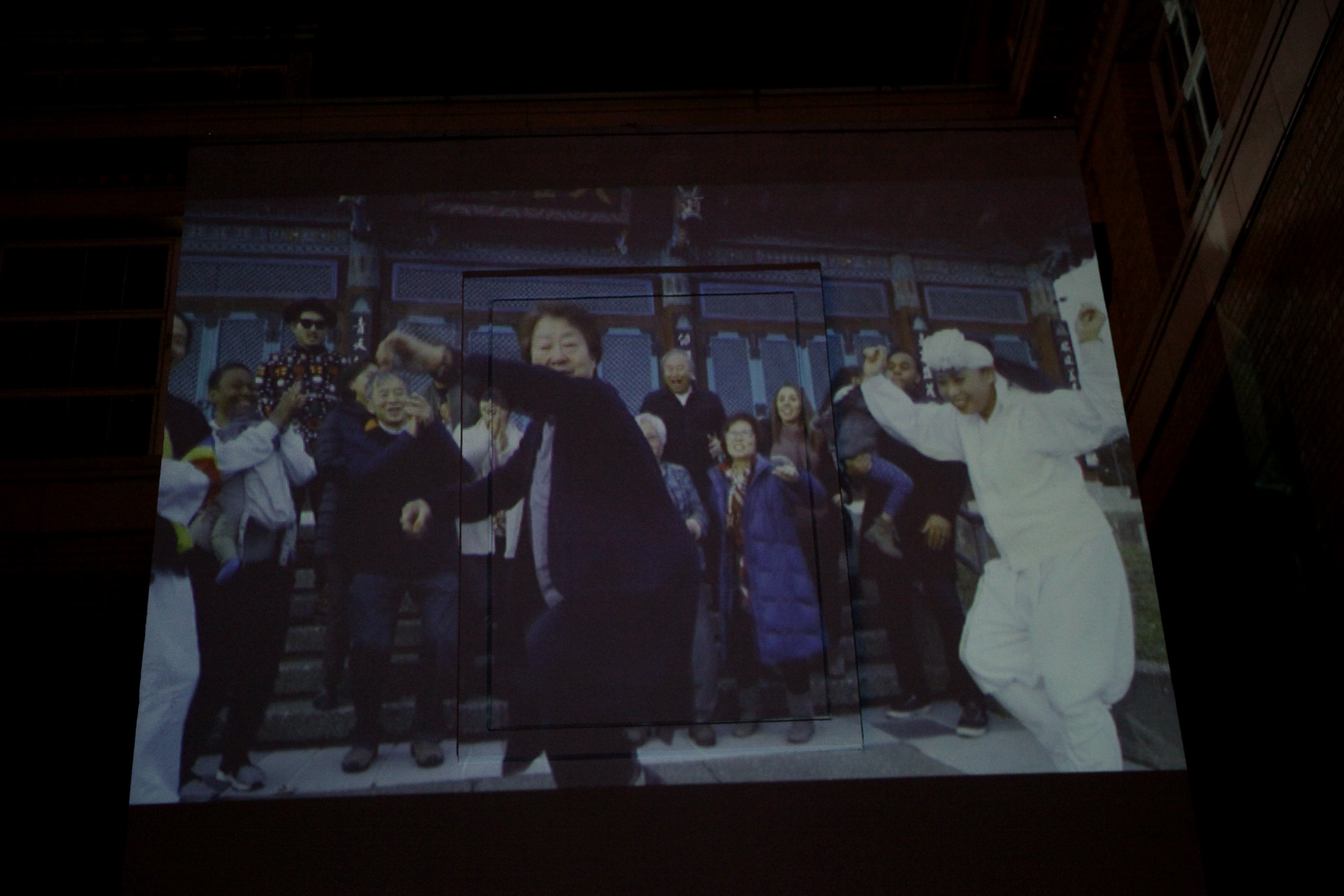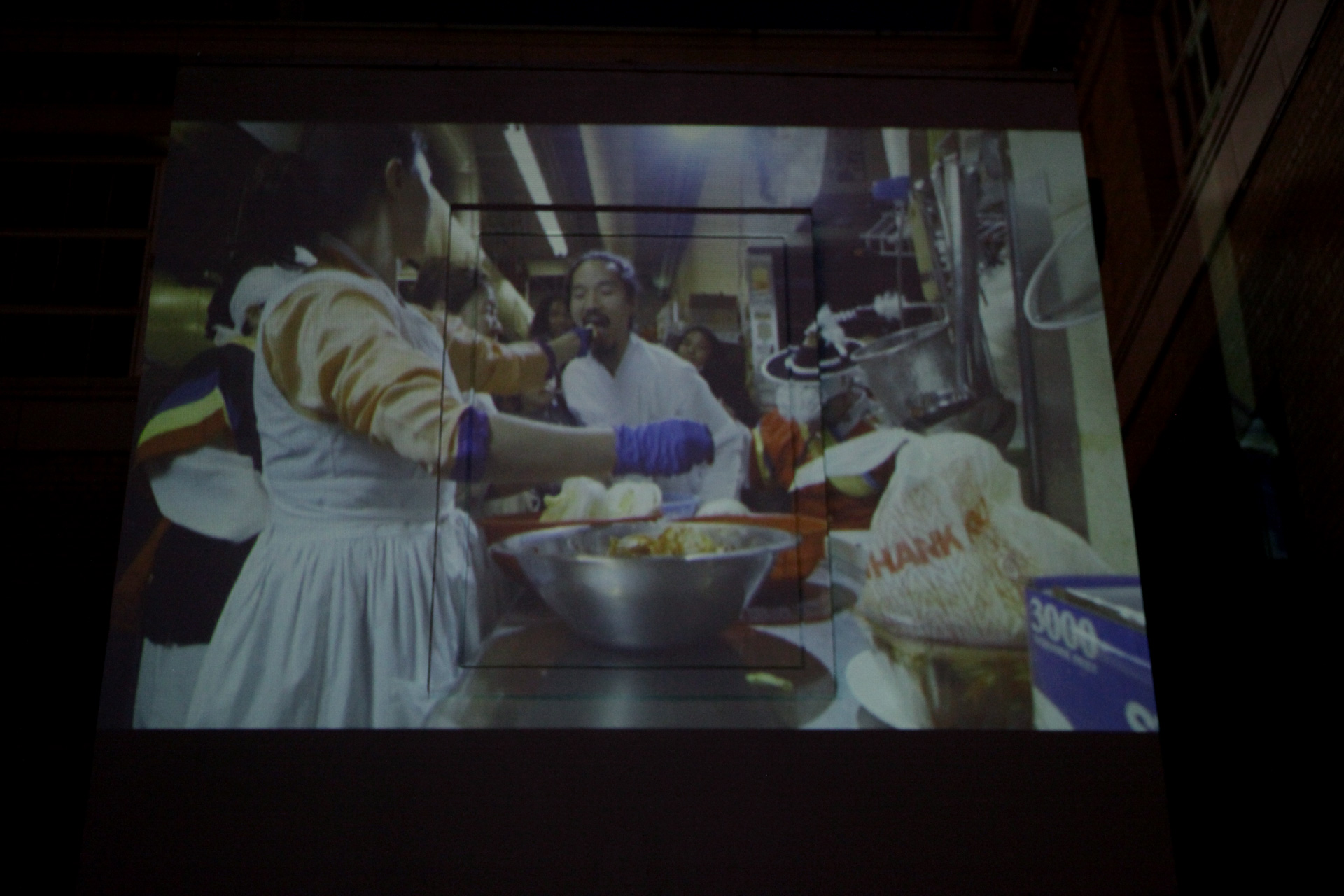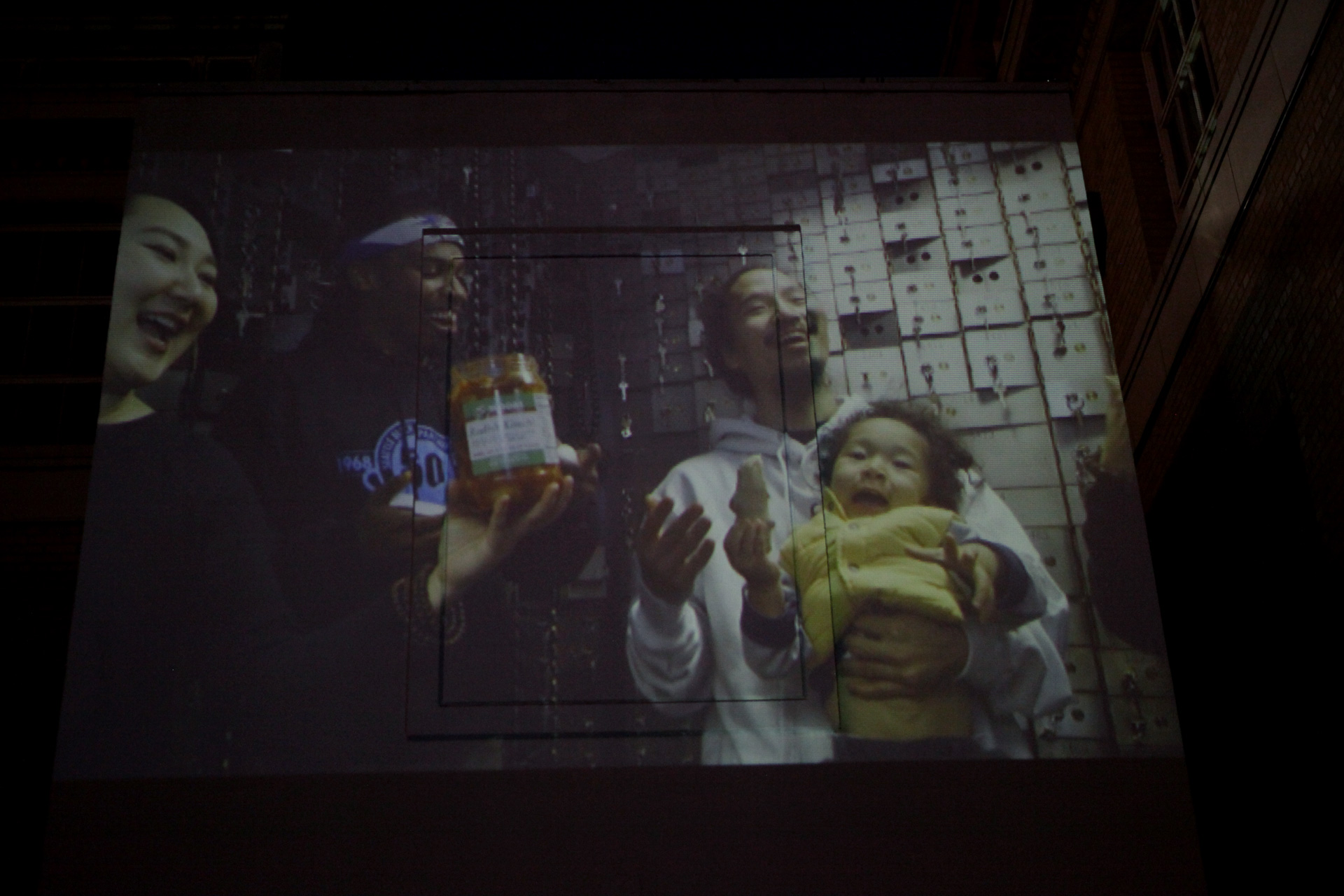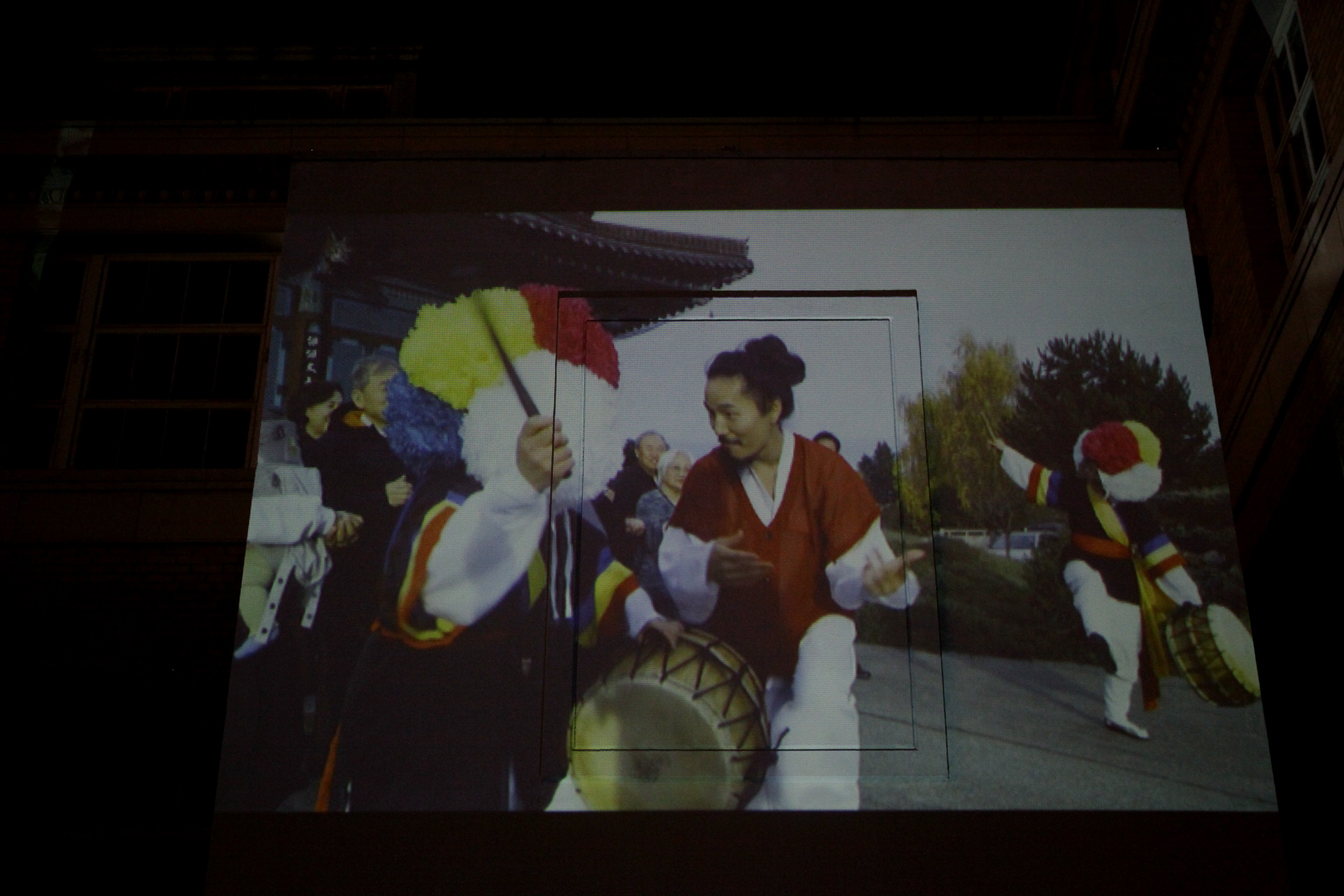On the High Wall: Che Sehyun
The Kimchi SongDecember 6 – 9, 2018
The Kimchi Song, by Che Sehyun


Installation views


Interview with Che Sehyun. DK Pan, and Britta Johnson about The Kimchi Song
HW:
Hi Che, thanks so much for sharing your art with us; do you want to talk a little bit about the ideas that led to you make this piece?
CS:
So yeah, these are just some nice clips from this kimchi music video that I shot this past month, and that’s part of a larger project called the G’ma project. G’ma stands for Grandma – I used to text message my family all the time, and instead of typing out ‘Grandma,’ I’d just put G’ma. The G’ma project is to honor our elders, our culture, and our ancestors in the modern world. That project was really born out of me becoming my Grandma’s caretaker a few years back.
I had always spent time with her and was very close to her and she raised me when I was really young, ‘cuz my family had a lot of difficulties. My dad was locked up right before I was born, and he was locked up for seven years. I was the youngest of five children as well, so my mom was by herself, you know, without people helping her, and basically my Grandma raised me for the most part until I started going to school. I would spend time with my family – they’d always come on weekends and I’d see them too – but I think my earliest memories are with her. We’d garden together, we’d make traditional foods, like we’d make our own doenjang, and make our own soy sauce, and we would roast our own gim on the stove and put sesame oil and sprinkle salt on it and give it to our family and friends. And we’d make kimchi at the house and we’d give it out to people, and she’d sometimes sell it to make a little bit of money too.
My Grandma was also like a caretaker for a lot of people too, so people would just drop the kids off to her house, and I’d be there and we’d all just play together. So I had a pretty different childhood than all my siblings growing up. I was really close to my Grandma, and then I moved back home; I started going to school, and I’d still see her pretty often, and then in the middle of my college years, she moved in with my mom because she had trouble taking care of herself. After my junior year in college, I also moved back home with my mom, so like, we moved into my mom’s house around the same time, and then living with my Grandma again, we spent a lot more time together. I was cooking for her; I was cooking for my family, and I’d make her traditional foods, I’d also make her American food and Mexican food, and we’d all try different kinds of food together.
And then after I graduated from college I became her official caretaker. I took this home care aide training – I became certified – and that was kinda my job, but the more that I spent time with my Grandma, I really started to see how, more than food and help with clothing and bathing and things like that, she more than anything just needed a friend. She needed somebody who could relate to her and feel connected and just have fun together. And so around that time, my mom was kind of getting close to retirement, and she really wanted to start to pursue her own interests, because her whole life was basically devoted to her five kids. Giving everything she had, working three jobs, you know, I wouldn’t even see her that much when I was growing up because she was always working, and then my siblings would kind of take care of me. But I always knew my mom loved me and she’d always take me around wherever she could, and she’d support us in every way she could, totally selfless, just incredible strength and loving woman. But so finally, once I’m out of college, things kind of slowed down, you know my siblings are kind of more successful and established in the world, so she actually started pursuing painting and music, which she’s always wanted to do but I never knew that, my whole life! I never even thought of my Mom as an artist growing up but she’s like this incredible painter! And she started learning the piano – my brother bought her this keyboard – and you know, I always wanted to learn the piano because my siblings played it, but by the time it got down to me, I didn’t get any music lessons. I didn’t get any private lessons because it was just too difficult, so much hardship. So my mom sometimes feels bad that, you know, she wishes she could have done more for me but then at the same time she kind of like, actually did everything she could, too. It is what it is, you know. I’m always thankful for everybody, not only my mom and my Grandma, but also my siblings too, because they really inspired me, took care of me, and even now when we relate to each other, it’s not like we’re friends, they’re just like second moms and second dads, you know, and I shouldn’t talk back to them but I do and then I get in trouble. (laughs) We’re not on equal planes, because they sacrificed and did so much for me too, kind of like how a parent would.
So anyways, my mom tried playing piano, and I always wanted to learn, and I never got lessons but it’s something I thought was so cool growing up, and so I just started jamming on keys; I took middle school band for French horn for like three years, so I kind of knew reading music. I knew middle C, I knew that every white note was a full, and the others a half step. So then I started playing some church hymns, like really basic ones based on just looking at the sheet music and remembering. I knew that these (left hand) are the chords and this (right hand) is the melodies, so I’d play melody with this hand, trying to figure it out and then I’d be like, oh I know this church song cuz’ I grew up singing it. So I’d be able to play his church song, and then my Grandma was like, ‘oh man you’re so talented, you’re so good;’ and she’d always encourage me, always tell me I can do whatever I want, I’ve just got to try my best put my heart and my mind into it. She was never like, ’do this’ or ‘do that,’ it was always ‘you can just do it, I believe in you,’ just this unending encouragement and belief in me. So then I was just joking around, playing music for my Grandma; she loved it, and then I was like, ‘I’m gonna make a song for you, Grandma,’ so my first piano composition was the Grandma song, and that was kind of like the birth of the G’ma project.
I played it on the piano, and I made a little video about it too, and I submitted that for a grant, for the G’ma project, and it got funded, and I was like, oh man this is so cool, because I was thinking that the kind of love and care she needed – this sense of community and genuine relationship and just enjoying life, you know, like enjoying art and music and company and good food, just like everybody else, I was thinking so many elders need this too. At the time I was also teaching at a Senior Center at Club Bamboo at ACRS, teaching them yoga and dance – I just called it a movement class because I’d just incorporate anything I thought they could physically do that I knew was good for them and safe. Cuz’ at the time I was breakdancing, and I was a certified yoga instructor, and I was doing martial arts, and I was doing Tai Chi, so I just kind of picked things that I thought would be fun and healthy for the elderly. The SoBeBa music video was actually the youth programs I was teaching plus the elders in the community all coming together around a kind of very universal anthem and message of ‘So Breath Easy, Be Aware.’ That was my first major art project, and then as soon as I finished that up, I was more into music after that because I’d never really done that before. That was my first song I produced, that was the first music video I produced, the first rap song I ever wrote and and performed. So that happened in that winter of 2014, and then I was like super into art, and then I wrote the Grandma song in January like right afterwards. And then I applied for some funding, and I got it, and I was like, ‘oh my god this is so cool, I want to keep doing this!’
I was producing more music, and I was composing more songs on the piano and the uke, and I had this idea of an event where we could bring the generations together and share our stories and, you know, kind of honor our culture, our elders, and our ancestors in a way that makes sense to people now. Because even just between me and my mom, the world has changed so much that it’s like, I can’t do what she did and it still makes sense to us now and especially my Grandma, I can’t do what she did and have it make sense to us now too, and then when I started learning more about my history… everything was kind of happening at the same time, like I was hearing stories from my grandmother I’ve never heard in my life, because I was spending more time with her than I ever had as an adult, and the things that she would tell me just kind of blew my mind. And then I was learning about Korean history too at the same time, so then I started to get my family history within this larger context of Korean history, within this larger context of global politics. I was just like, ‘oh my gosh, there’s so much here right now,’ you know. I mean, this is how hard my grandma’s life was: she told me that child birthing is easy. She said that when you have a child you can feel when they’re coming, and you just know. And when that time comes you just walk around very slowly around your house, and you can just deliver your own baby. And I was like, blown away! Like, how is that easy? Child birthing is, you know, so painful and crazy and you need so much support, all these things, you know, but she just did it by herself, and she considered that easy. And she’d tell me other stories about her life, she’d tell me I shouldn’t say that to other people or that she’s not supposed to say this, but this is kind of what happened.
Just learning about her, and combining it with my own research and understanding of Korean history, and my evolving understanding of society and the world, it’s totally changed my life. I was just like, man, this is not just a fun thing to do for my grandma or the elders that I was working with, this is a lifetime’s work. Because why I think that the elders and the culture and ancestors are so important is because when I think about how colonization, imperialism, and white supremacy have systematically gone around the world and just destroyed and exploited and taken over people and just extracted their labor or their resources or their creativity or even their culture, you know, like even the swastika is a Buddhist symbol that got turned upside down and turned around. And so I was thinking about it, I noticed this pattern – I was a CHID major, along with English and physiology, at UW – and when I was studying CHID, it’s like intellectual history where instead of studying history through the vein of a nation-state, or through the great man hypothesis, that history goes through great people, it’s studying history through the course of an idea, like where did this idea come from? You can look up any text anywhere, and anywhere this idea is popping up you can try to put together a history based on this idea. So for me at the time, I was really into activism and racism – not into racism, but into addressing racism in a healthy, positive, harmonious way – I was studying racism and white supremacy as my idea to follow around the world, and a pattern that I noticed was that the colonizers, the racists, the imperialists, they do the same thing everywhere they go. They rape the women, they re-educate the children, and they destroy the culture. And I’m like, wow, this must be the stronghold of people then, if that’s always a target, and that’s the way that they just topple governments, and topple civilizations that have lasted for like thousands of years, then this is really the strength of our people.
